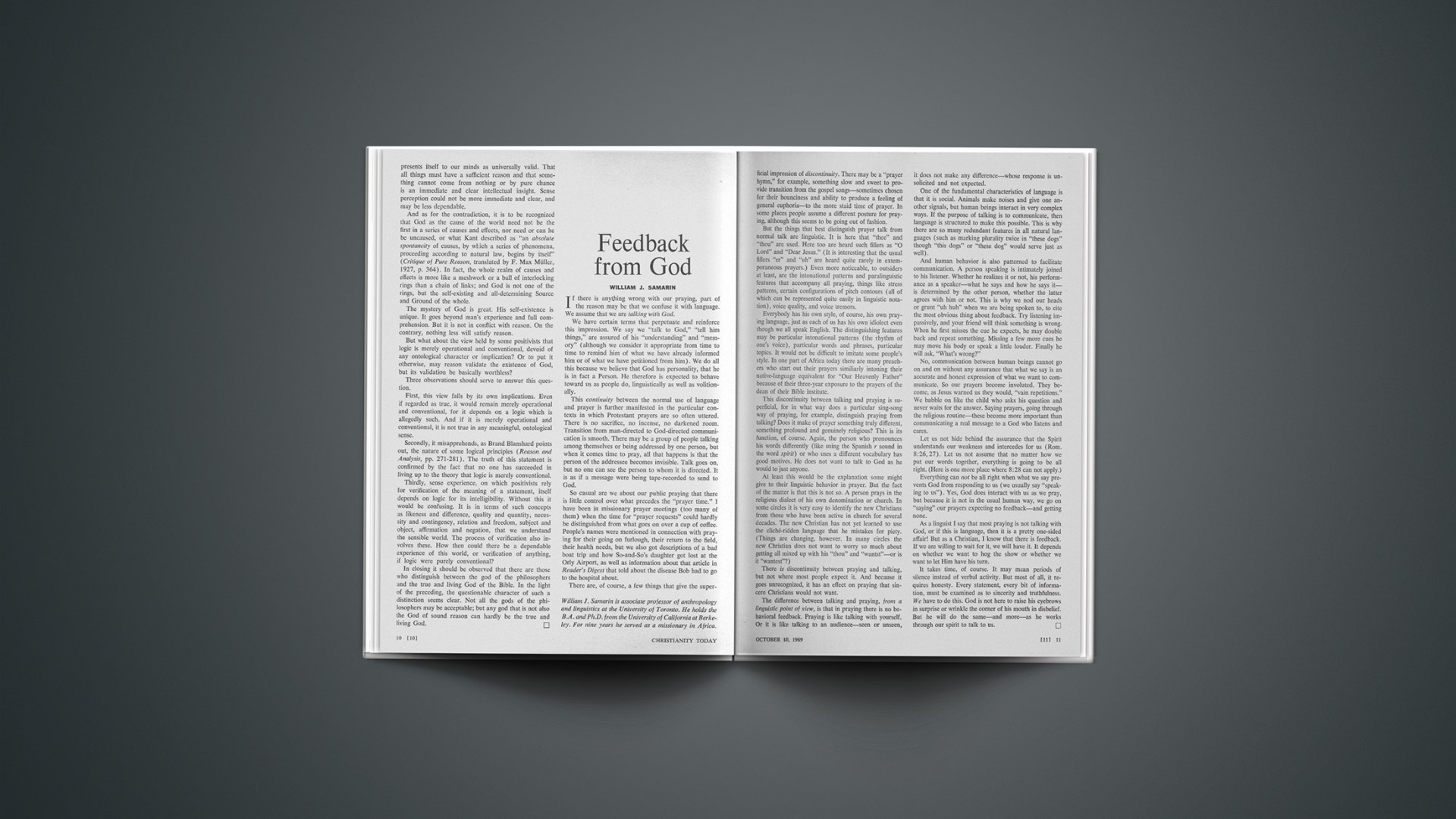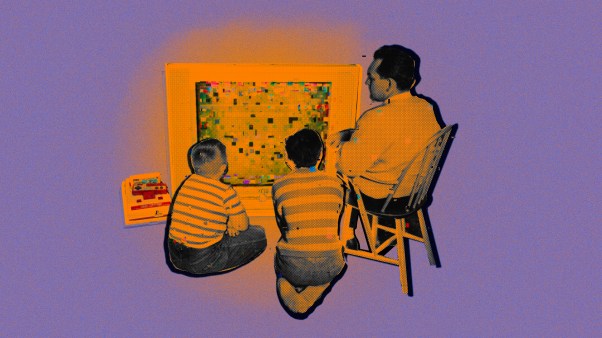If there is anything wrong with our praying, part of the reason may be that we confuse it with language. We assume that we are talking with God.
We have certain terms that perpetuate and reinforce this impression. We say we “talk to God,” “tell him things,” are assured of his “understanding” and “memory” (although we consider it appropriate from time to time to remind him of what we have already informed him or of what we have petitioned from him). We do all this because we believe that God has personality, that he is in fact a Person. He therefore is expected to behave toward us as people do, linguistically as well as volitionally.
This continuity between the normal use of language and prayer is further manifested in the particular contexts in which Protestant prayers are so often uttered. There is no sacrifice, no incense, no darkened room. Transition from man-directed to God-directed communication is smooth. There may be a group of people talking among themselves or being addressed by one person, but when it comes time to pray, all that happens is that the person of the addressee becomes invisible. Talk goes on, but no one can see the person to whom it is directed. It is as if a message were being tape-recorded to send to God.
So casual are we about our public praying that there is little control over what precedes the “prayer time.” I have been in missionary prayer meetings (too many of them) when the time for “prayer requests” could hardly be distinguished from what goes on over a cup of coffee. People’s names were mentioned in connection with praying for their going on furlough, their return to the field, their health needs, but we also got descriptions of a bad boat trip and how So-and-So’s daughter got lost at the Orly Airport, as well as information about that article in Reader’s Digest that told about the disease Bob had to go to the hospital about.
There are, of course, a few things that give the superficial impression of discontinuity. There may be a “prayer hymn,” for example, something slow and sweet to provide transition from the gospel songs—sometimes chosen for their bounciness and ability to produce a feeling of general euphoria—to the more staid time of prayer. In some places people assume a different posture for praying, although this seems to be going out of fashion.
But the things that best distinguish prayer talk from normal talk are linguistic. It is here that “thee” and “thou” are used. Here too are heard such fillers as “O Lord” and “Dear Jesus.” (It is interesting that the usual fillers “er” and “uh” are heard quite rarely in extemporaneous prayers.) Even more noticeable, to outsiders at least, are the intonational patterns and paralinguistic features that accompany all praying, things like stress patterns, certain configurations of pitch contours (all of which can be represented quite easily in linguistic notation), voice quality, and voice tremors.
Everybody has his own style, of course, his own praying language, just as each of us has his own idiolect even though we all speak English. The distinguishing features may be particular intonational patterns (the rhythm of one’s voice), particular words and phrases, particular topics. It would not be difficult to imitate some people’s style. In one part of Africa today there are many preachers who start out their prayers similiarly intoning their native-language equivalent for “Our Heavenly Father” because of their three-year exposure to the prayers of the dean of their Bible institute.
This discontinuity between talking and praying is superficial, for in what way does a particular sing-song way of praying, for example, distinguish praying from talking? Does it make of prayer something truly different, something profound and genuinely religious? This is its function, of course. Again, the person who pronounces his words differently (like using the Spanish r sound in the word spirit) or who uses a different vocabulary has good motives. He does not want to talk to God as he would to just anyone.
At least this would be the explanation some might give to their linguistic behavior in prayer. But the fact of the matter is that this is not so. A person prays in the religious dialect of his own denomination or church. In some circles it is very easy to identify the new Christians from those who have been active in church for several decades. The new Christian has not yet learned to use the cliché-ridden language that he mistakes for piety. (Things are changing, however. In many circles the new Christian does not want to worry so much about getting all mixed up with his “thou” and “wantst”—or is it “wantest”?)
There is discontinuity between praying and talking, but not where most people expect it. And because it goes unrecognized, it has an effect on praying that sincere Christians would not want.
The difference between talking and praying, from a linguistic point of view, is that in praying there is no behavioral feedback. Praying is like talking with yourself. Or it is like talking to an audience—seen or unseen, it does not make any difference—whose response is unsolicited and not expected.
One of the fundamental characteristics of language is that it is social. Animals make noises and give one another signals, but human beings interact in very complex ways. If the purpose of talking is to communicate, then language is structured to make this possible. This is why there are so many redundant features in all natural languages (such as marking plurality twice in “these dogs” though “this dogs” or “these dog” would serve just as well).
And human behavior is also patterned to facilitate communication. A person speaking is intimately joined to his listener. Whether he realizes it or not, his performance as a speaker—what he says and how he says it—is determined by the other person, whether the latter agrees with him or not. This is why we nod our heads or grunt “uh huh” when we are being spoken to, to cite the most obvious thing about feedback. Try listening impassively, and your friend will think something is wrong. When he first misses the cue he expects, he may double back and repeat something. Missing a few more cues he may move his body or speak a little louder. Finally he will ask, “What’s wrong?”
No, communication between human beings cannot go on and on without any assurance that what we say is an accurate and honest expression of what we want to communicate. So our prayers become involuted. They become, as Jesus warned us they would, “vain repetitions.” We babble on like the child who asks his question and never waits for the answer. Saying prayers, going through the religious routine—these become more important than communicating a real message to a God who listens and cares.
Let us not hide behind the assurance that the Spirit understands our weakness and intercedes for us (Rom. 8:26, 27). Let us not assume that no matter how we put our words together, everything is going to be all right. (Here is one more place where 8:28 can not apply.)
Everything can not be all right when what we say prevents God from responding to us (we usually say “speaking to us”). Yes, God does interact with us as we pray, but because it is not in the usual human way, we go on “saying” our prayers expecting no feedback—and getting none.
As a linguist I say that most praying is not talking with God, or if this is language, then it is a pretty one-sided affair! But as a Christian, I know that there is feedback. If we are willing to wait for it, we will have it. It depends on whether we want to hog the show or whether we want to let Him have his turn.
It takes time, of course. It may mean periods of silence instead of verbal activity. But most of all, it requires honesty. Every statement, every bit of information, must be examined as to sincerity and truthfulness. We have to do this. God is not here to raise his eyebrows in surprise or wrinkle the corner of his mouth in disbelief. But he will do the same—and more—as he works through our spirit to talk to us.
William J. Samarin is associate professor of anthropology and linguistics at the University of Toronto. He holds the B.A. and Ph.D. from the University of California at Berkely. For nine years he served as a missionary in Africa.










